Memory Transmission
Memory Transmission mode has standard fax, Internet Fax, IP-Fax, e-mail transmission, and folder transmission.
![]()
If there is a power failure (the main power switch is turned off) or the machine is unplugged for about one hour, all the documents stored in memory are deleted. As soon as the main power switch is turned on, the Power Failure Report is printed to help you check the list of deleted files. Simply turning off the power by pressing the operation switch does not delete stored documents. See “Turning Off the Main Power / In the Event of Power Failure”, Troubleshooting.
If memory is full (0% appears in “Memory” at the upper right of the screen), Memory Transmission is disabled. Use Immediate Transmission instead.
![]() Make sure [Immed. TX] is not highlighted.
Make sure [Immed. TX] is not highlighted.
Normally Memory Transmission mode is selected.
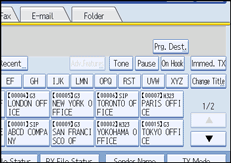
![]() Place the original into the ADF.
Place the original into the ADF.
![]() Make the scan settings you require.
Make the scan settings you require.
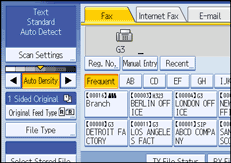
For details about the scan settings, see “Scan Settings”.
![]() Using the number keys or a Destination key, specify a destination.
Using the number keys or a Destination key, specify a destination.
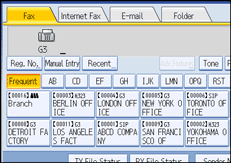
If you make a mistake, press the [Clear/Stop] key, and then enter the correct number.
For details about specifying a destination, see “Specifying a Destination”.
![]() When sending the same original to several destinations (broadcasting), press [Add] to specify the destinations.
When sending the same original to several destinations (broadcasting), press [Add] to specify the destinations.
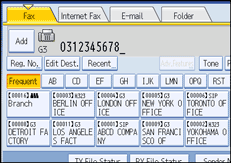
You do not have to press [Add] when adding a destination using the destination list.
![]() Specify the next destination.
Specify the next destination.
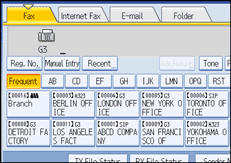
Press the transmission type tab to switch the transmission type between fax/IP-Fax, Internet Fax, e-mail, and folder.
Multiple transmission types can be specified simultaneously.
![]() Press the [Start] key.
Press the [Start] key.
![]()
If the combined total number of programmed destinations exceeds the maximum value, only Immediate Transmission is possible.
For the maximum values of the following items, see “Maximum Values”.
Number of documents you can store in memory for Memory Transmission
Number of pages you can store in memory (using A4 Standard <ITU-T
 1 Chart>)
1 Chart>)Number of destinations you can specify per file
Number of destinations you can specify for all files (including files in memory)

